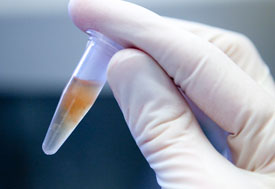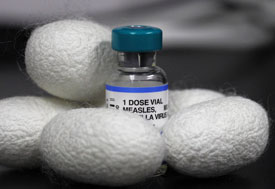Silk product may eliminate need for vaccine cold chain
July / August 2012 | Volume 11, Issue 4

Photo courtesy of Tufts University
Silk protein may stabilize vaccines and other
medicines so that refrigeration is not required,
which would save millions of dollars in low-
resource settings.

Photo courtesy of Tufts University
A new silk-based stabilizer may eliminate the need to refrigerate vaccines and antibiotics, according to NIH-funded researchers. The new product could pave way for enhanced delivery and storage in low-resource countries, eliminating the need to provide a cold chain during transport to the clinic.
Medicines often need to be refrigerated to prevent alteration of their chemical structures, which can render them ineffective. By immobilizing their bioactive molecules using silk protein matrices, researchers were able to protect and stabilize both live vaccines and antibiotics when stored at temperatures of 140 degrees Fahrenheit for extended periods of time.
The research was conducted in the lab of Dr. David Kaplan at the Tufts University School of Engineering and supported by the NIH's National Institute of Biomedical Imaging and Bioengineering (NIBIB).
Keeping medications cold from production until they are used in treatment is a costly process, accounting for as much as 80 percent of the price of vaccinations. Failures in the cold chain result in the loss of nearly half of all global vaccines, according to researchers.
"New studies are already under way," Kaplan reported. "We have already begun trying to broaden the impact of what we're doing to apply to all vaccines. Based on what we've seen with other proteins, peptides and enzymes, there's no reason to believe that this wouldn't be universal. This could potentially eliminate the need for a cold-chain system, greatly decreasing costs and enabling more widespread availability of these lifesaving drugs."
More Information
To view Adobe PDF files,
download current, free accessible plug-ins from Adobe's website.